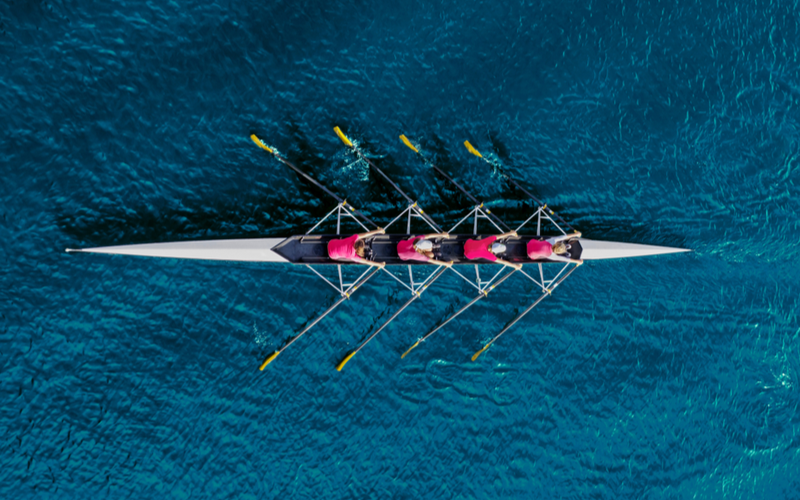Chris Hudgell had always been interested in rowing. It wasn’t until he was in his late 20s that he first took to the water but in the decades since he has been a passionate oarsman. He has since gone on to compete in State, Australian and World Master games with rowing a mainstay in his life. Chris shares his insights on the benefit of rowing for recharging his batteries and what it has taught him about leadership.
I didn’t have the opportunity to row when I was at school. It was my father in law, who had a long association with a local rowing club, who suggested that I give it a try. I first tried rowing in my late twenties, but I did not have many in my age group to team up with. It was much later when the masters competition began to take shape that I started to take rowing a little more seriously.
Rowing has taken me to many far flung places as I’ve had the opportunity to compete in global rowing competitions. But what’s been most wonderful for me is what it’s given me, both personally and professionally. More than just early morning starts, rowing has a lot to teach all of us about life and leadership. Here are a few of my top learnings.
Balance and nature
I love water. If I’m not rowing on the water, I’m swimming in it or walking around it. Rowing is one of those sports that really does allow you to connect with nature.
In my professional life I’m the General Manager for Quality, Risk and Compliance. It’s a busy and quite technical role. Rowing gives me balance.
The thing with rowing is that you really have to concentrate on the task at hand or you’ll let the crew down. It helps to clear my head and that makes such a big difference.
You’ve got the benefit of being outdoors and in the fresh air. With masters rowing, we go right through winter so we’re sometimes rowing in the dark. There is an element of discipline that this teaches you. If you don’t show up, you’re letting the team down. You also benefit from the support of your club and crew. It becomes like a community.
It’s all about teamwork
Unless you’re doing single sculling, rowing is a team sport. You need the whole crew to be on the same page to make it happen.
In every crew, someone will take the lead, generally the stroke of the crew. Everyone else follows the lead. It’s not necessarily the person who’s been there the longest so it allows people with different skills and qualifications to step into leadership.
Rowing isn’t about arms and shoulders as many people think. Rowing is a leg drive. But it’s actually timing and placement that are most important. If the crew can synchronise their timing, they can do much better than one big guy trying to slog it out and pick up the slack for the rest of the crew.
There are different types of rowing – sculling and sweep oar – and each has technical elements that you can adjust such as the length of the oars, the shape of the boat or the position of the feet. But without teamwork, it doesn’t matter. Even lifting the boat off the rack and into the water requires team coordination. You just need to work together to get it done. When you’re in a crew, it’s important to remember that no one wins a race by themselves.
A world of possibility
At masters level there are now mixed crews. This expanded the level of the competition completely. I have watched that transformation and seen the level of skill in the crews and clubs increase and that has been a really positive thing.
I have met some very talented people through rowing. I’ve rowed with people in their 20s, all the way through to people in their 80s. Age is no barrier.
If you want to row competitively at a masters level you can travel to new places and meet new people. You can take rowing as far as you want.
Chris Hudgell is a Strategic Senior Executive within the non-for-profit sector.



